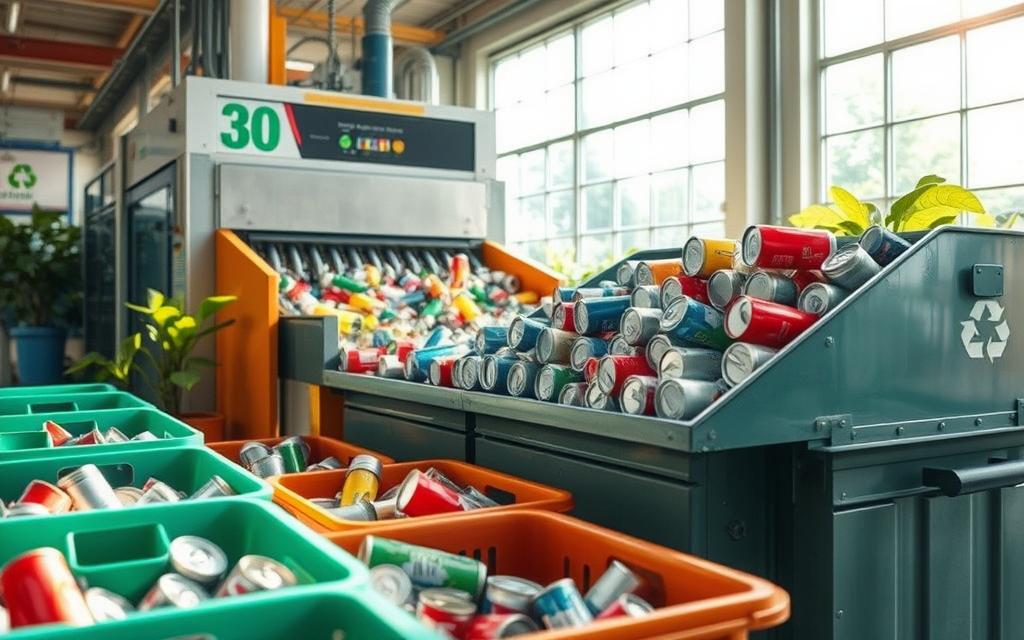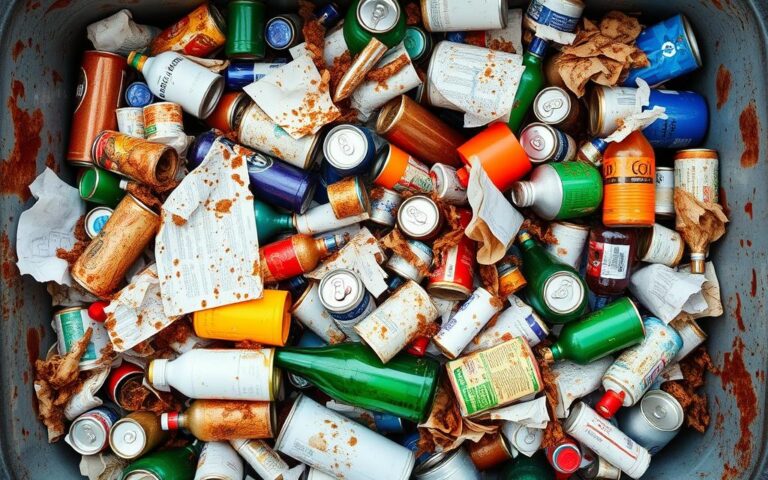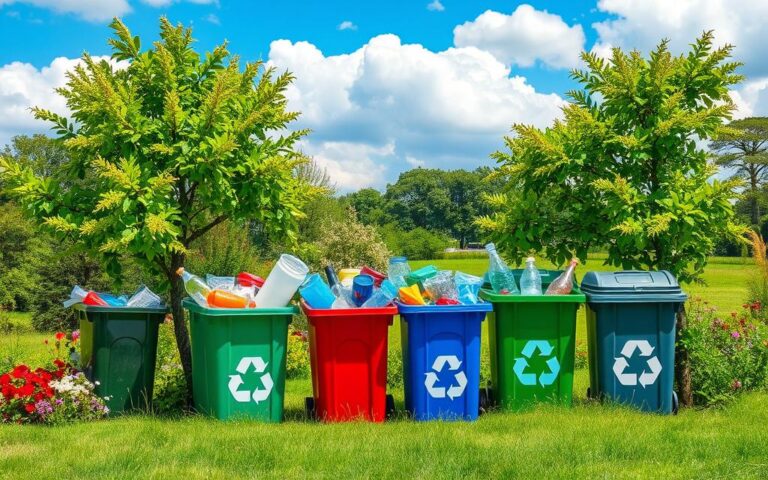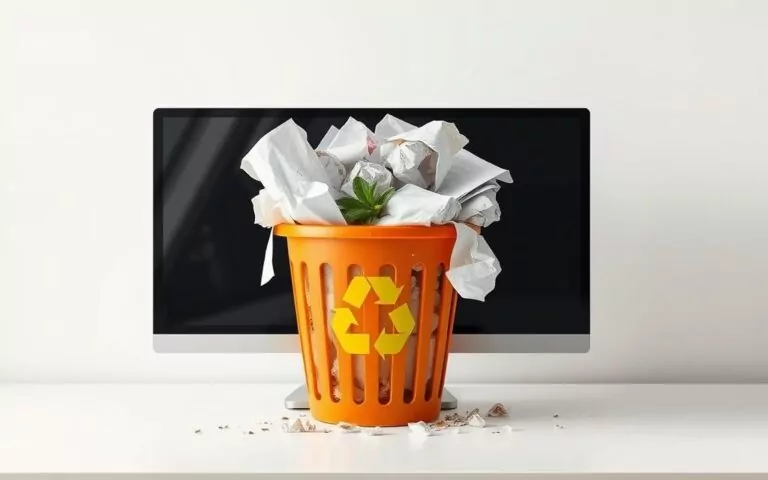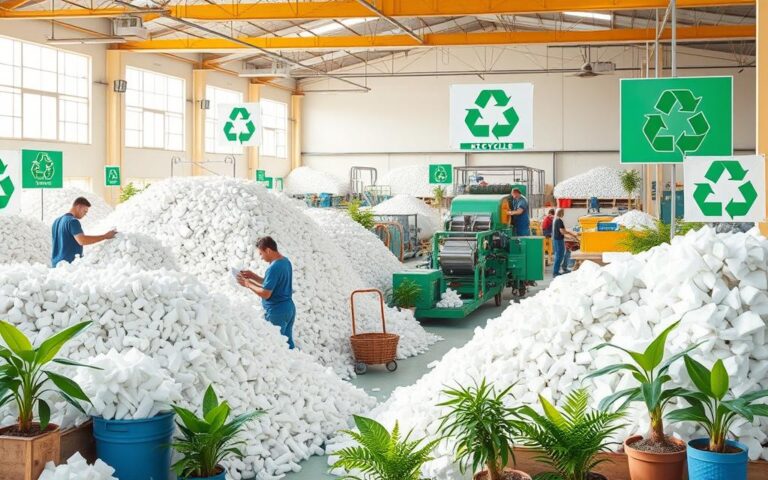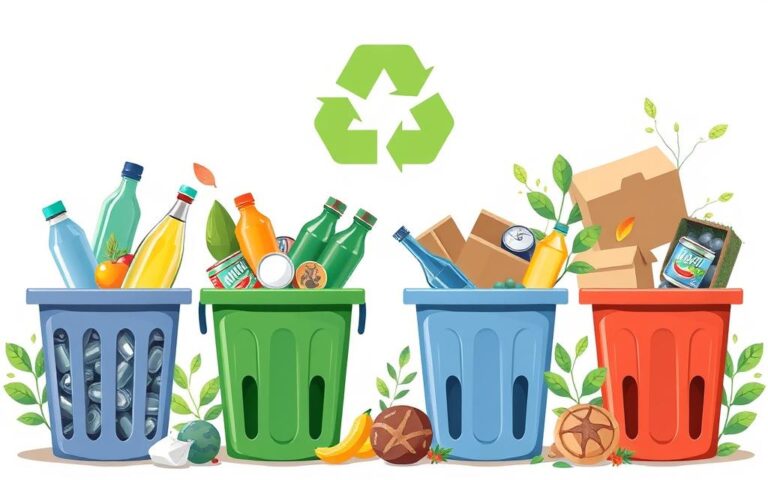Can You Recycle Aerosol Cans? Safe Disposal Tips
Aerosol cans are everywhere in our homes, and we use millions every year in the UK. They’re made of high-value metals like steel or aluminium. These metals can be recycled over and over. But, it’s key to know how to recycle them right. This is because they can be seen as hazardous waste if thrown away wrongly. The EPA says many aerosol cans could be harmful because of their volatile propellants. This could be bad for our planet.
Surprisingly, only about 30% of these cans are recycled. It’s important we follow eco-friendly disposal tips. Doing this helps us stick to local rules and protects the environment. We will look at the right and wrong ways to recycle aerosol cans. You will learn great tips for safe disposal.
Key Takeaways
- Aerosol cans are made of recyclables like aluminium and steel.
- Plastic caps from aerosol cans should be removed and recycled separately.
- Some regions classify aerosol cans as universal waste and ban them from landfills.
- Empty aerosol cans are not labelled as household hazardous waste.
- Always check local guidelines to ensure proper disposal methods are followed.
Understanding Aerosol Cans and Their Impact
Aerosol cans play a big role in various industries, including everyday household items. They are made from metals like steel and aluminium. These metals can be recycled. But, the cans often contain dangerous materials. These materials can be harmful if not dealt with properly.
The Production of Aerosol Cans
In 2016, the U.S filled an estimated 3.75 billion aerosol cans for different uses. There are over 25,000 places making these cans. Out of these, 7,483 are known as big quantity generators. Laws on making and getting rid of aerosol cans help reduce harm to the environment. The retail sector, making up 69% of these sites, plays a big part. It creates about 303 tons of aerosol can waste. The manufacturing industry adds about 7,771 tons. Following the right ways to dispose of these cans is key for protecting our environment.
Environmental Concerns of Improper Disposal
When aerosol cans aren’t thrown away correctly, it’s a big problem. Dangerous stuff inside can harm the water and soil. This isn’t good for the planet or people’s health. Also, places where cans are dumped wrongly can catch fire easily. They might even explode, especially if the cans aren’t completely empty. We must understand the effects of aerosol cans. And we should follow the best ways to get rid of them. This is important for keeping our planet safe.
| Industry | Large Quantity Generators (LQG) | Waste Produced (tons) |
|---|---|---|
| Retail Trade | 5,194 | 303 |
| Manufacturing | 1,238 | 7,771 |
| Other Industries | Varies | Varies |
Creating good rules for making and disposing of aerosol cans can save a lot of money. We’re talking about savings between $5.3 million and $47.8 million each year. Teaching people about these rules can help. It can lessen the dangerous waste we produce. This makes things safer and better for our world.
Can You Recycle Aerosol Cans?
As people try to be more eco-friendly, they’re curious about recycling aerosol cans. These cans can be recycled if you prepare them right. This helps reduce waste and save resources. It’s important to know how to recycle them properly.
Recyclability of Common Aerosol Cans
Aerosol cans are often made of aluminium or steel, which are recyclable materials. But, they need to be totally empty for recycling to work. Some people don’t know that leftover liquid can stop recycling and cause safety issues. The plastic cap should be taken off as it might not be recyclable with the metal.
Hazardous Waste Classification by the EPA
The EPA says some aerosol cans are hazardous waste if they’re not fully empty. These need to go to special waste programmes to be safe. A can that seems “empty” could still have dangerous gases inside. Following EPA rules is crucial to recycle these safely.
Liquids in the cans need proper treatment, especially if they’re very hazardous. Some must be cleaned thoroughly three times to be safe. Local recycling schemes help with safe aerosol can recycling, keeping in line with EPA advice.
Preparation Steps for Recycling Aerosol Cans
Recycling aerosol cans needs a few important steps to be safe and efficient. It’s essential to make sure cans are empty and take extra steps like taking off the caps. Doing this helps the recycling process and keeps the workers safe.
Ensuring the Can is Empty
It’s very important that aerosol cans are totally empty before you recycle them. If there’s still product inside, it should go through a household hazardous waste programme. To check, hold the can near a soft surface and spray until nothing comes out. Recycling centres might not accept cans that aren’t completely empty. These can pose risks.
Removing Plastic Caps
Taking off the caps from aerosol cans is a key step in recycling. The caps and the cans often need different recycling methods. You should check what your local area recommends. Recycling right follows local rules and makes the whole process more efficient. For more details, check this resource.
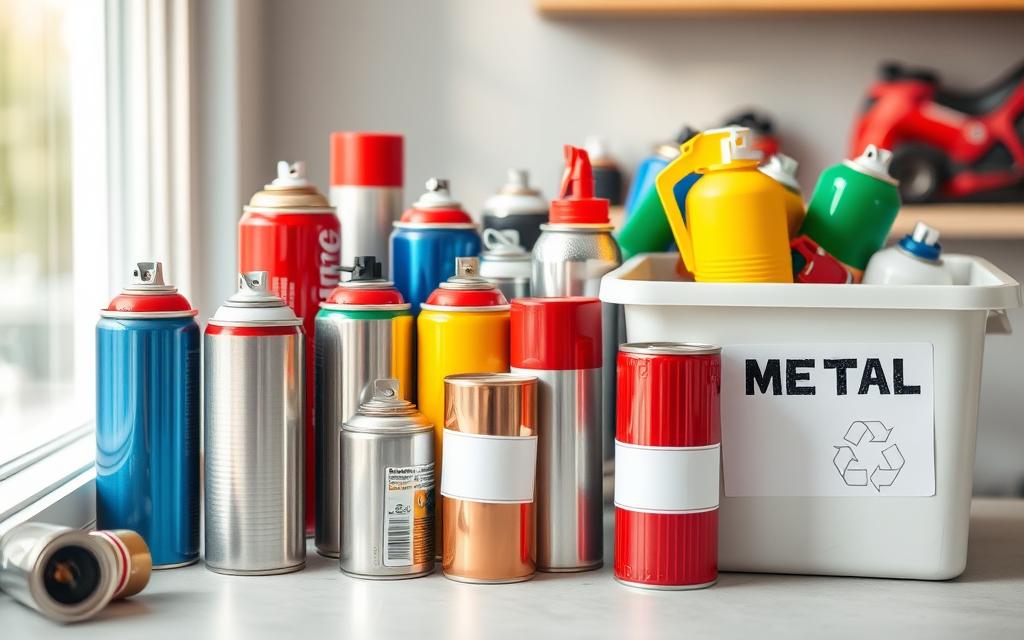
In short, correctly preparing aerosol cans for recycling is very important. Making sure cans are empty and removing the caps helps a lot. This careful approach reduces environmental harm. It also acknowledges the value of the metal in the cans. They’re worth a lot collectively in the market.
The Risks of Improper Aerosol Can Disposal
Not handling aerosol can disposal correctly can lead to serious dangers such as fires and explosions. Even an “empty” can might still hold pressure and flammable material inside. This risk has caused real damage and loss of life due to illegal disposal practices. It shows why it’s crucial to follow proper disposal methods to reduce these dangers.
Potential for Fires and Explosions
The issue also brings legal problems into the picture. The Environmental Protection Agency (EPA) sees aerosol cans as hazardous waste. This is because they can contain dangerous substances like brake cleaner and paint. Failing to follow laws like the Resource Conservation and Recovery Act (RCRA) could lead to fines and other penalties. So, knowing and following the rules is vital.
Legal Implications of Unlawful Disposal
In the United States, about 3.5 billion aerosol cans are made yearly, but only 30% are recycled. This fact stresses the need to focus on safe and lawful waste management. Proper recycling helps prevent fires, saves the environment, and avoids heavy fines. By using systems like Aerosolv, businesses can dispose of aerosol cans safely. This action helps avoid legal problems and contributes to a healthier planet.
FAQ
Can all aerosol cans be recycled?
Many aerosol cans are made from steel or aluminium and can be recycled. They must be empty and follow local rules. Always ask your local recycling spot for their rules.
What should I do if my aerosol can is not empty?
If there’s still stuff in your aerosol can, it’s hazardous waste. Don’t throw it in the bin. Instead, use a special waste programme.
How do I ensure my aerosol can is empty before recycling?
To make sure your can is empty, spray it onto a piece of cloth until nothing comes out. This removes any leftover pressure and contents. Always be careful and follow your area’s rules when doing this.
What happens if I improperly dispose of aerosol cans?
Wrongly disposing of aerosol cans poses big risks. It can cause fires or explosions because of the pressure and flammable stuff inside. You might also face legal trouble if you break hazardous waste laws.
Why are some aerosol cans classified as hazardous waste?
Aerosol cans with pressurised substances and harmful chemicals are seen as hazardous waste by the EPA. This helps keep the environment safe and fits with local rules.
Are plastic caps from aerosol cans recyclable?
Plastic caps usually can’t go with metal recycling. Take them off before recycling the can. Look up what your local recycling says about disposing of plastic caps.

